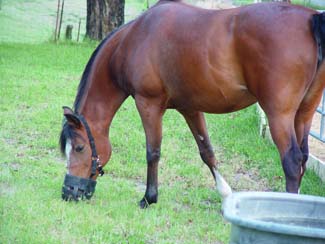Managing horses on spring pastures
Managing horses on spring pastures can prevent health problems.
Early spring pastures are lush in nutrients. A horse that has been stalled through the long Michigan winter may be at risk to laminitis if their forage source is abruptly switched from hay to lush spring pasture. There are management practices that can prevent or minimize problems when introducing horses to pasture in the spring.
1. Restrict the grazing time. Allow horses on the pasture for 20 minutes the first day and increase the grazing time by five minutes per day over a two-week period until they have adapted to the new feed source.
2. Feed hay immediately before horses are turned out on pasture during the adjustment period. They fill their stomachs somewhat, thus helping to prevent overeating. This practice curbs their appetite and allows them to discriminate between appropriate pasture foliage and weeds. There can be potentially toxic weeds in some pastures and, if horses are very hungry, they may not be selective about what they eat.
3. Supplement grazing with hay. If pasture foliage is sparse, supplementing with hay might be necessary to provide sufficient energy and other nutrients. This practice also helps prevent consuming weeds because under some pasture conditions the weeds outgrow other foliage.
4. Avoid grazing early spring pasture. If a horse has a history of founder, avoid grazing in the first four weeks of spring growth; then follow Rules 1 and 2 when introducing a horse to the pasture.
5. Use a grazing muzzle. If a horse that is susceptible to founder must be turned out on pasture, use a grazing muzzle to limit pasture consumption.

This mare's pasture consumption is carefully managed with a grazing muzzle. Photo credit: Kim Nylander
For more information read the following MSUE News articles:
- Horse pasture and fructan concentrations
- Pastures provide a valuable feed source for horses
- Spring pastures put some horses at health risk
Additional Resources Related to the Topic:
My Horse University and eXtension Free Archived Webcasts:
- Equine Metabolic Syndrome
Dr. Raymond Geor Recorded October 2010 - Countermeasures for Equine Laminitis: Carbohydrate Profiles in Feeds and Forages
Dr. Bridgett McIntosh, Recorded: April 2009 - Pasture Management for Horse Acreages
Dr. Dave Freeman, Recorded: February 2009
eXtension/horse Learning Lessons:
This article is an excerpt from My Horse University Online Horse Nutrition Course. Other resources offered by My Horse University and eXtension HorseQuest include a free monthly e-newsletter, free monthly webcasts and social networks on Facebook , Twitter and YouTube.



 Print
Print Email
Email

